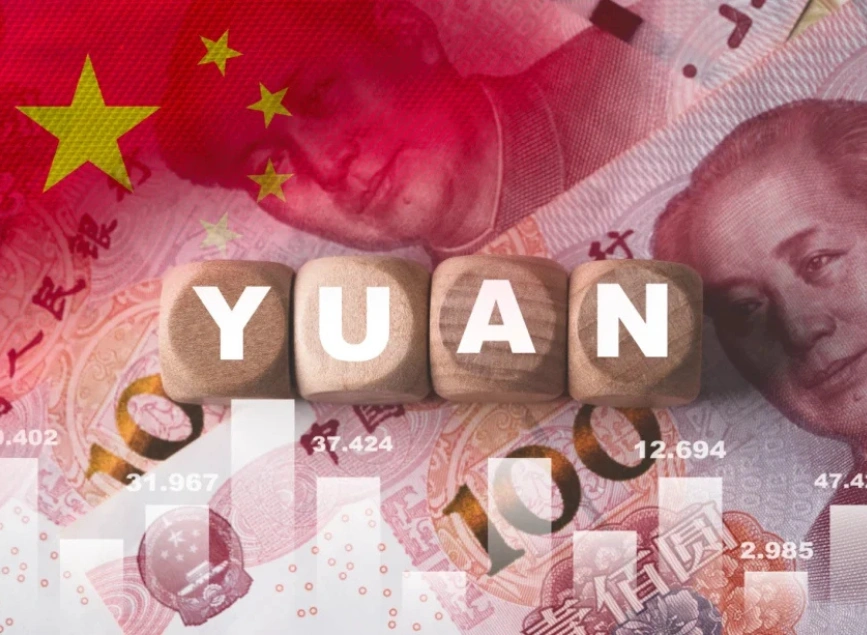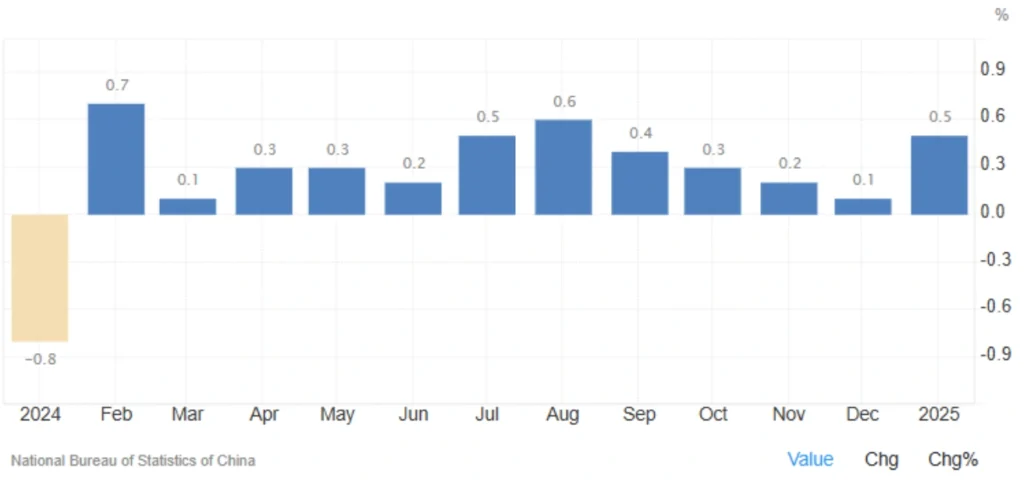
China’s Inflation Rate Increase in January 2025: A Closer Look
China’s inflation rate saw a notable increase in January 2025, rising to 0.5% from 0.1% in December, surpassing the market forecast of 0.4%. This marks the highest inflation rate since August 2024. The surge is mainly attributed to seasonal demand from the Lunar New Year celebrations and the Chinese government’s ongoing economic stimulus measures.
Key Details of China’s Inflation in January
Food Prices See Notable Growth
- After a decline in December, food prices increased by 0.4% in January.
- Pork prices surged by 13.8%, up from 12.5% in December.
- Fresh vegetable prices also saw a significant rise of 2.4%, compared to just 0.5% in December.
Non-Food Sectors Experience Inflation Acceleration:
- Housing prices rose slightly by 0.1%, while healthcare costs increased by 0.7%, a decrease from 0.9% in December.
- Education costs spiked by 1.7%, up from 0.9% in the previous month.
- Transportation costs, which had seen a significant drop in December, continued to decrease at a slower pace—falling by 0.6% compared to 2.2% in December.
Monthly Inflation Trends
- The Consumer Price Index (CPI) climbed by 0.7% in January, showing an increase from 0% in December. However, this was still below the forecasted 0.8%.
- This increase marks the highest monthly inflation rate in the past 11 months, signaling a shift in price trends.
What Does This Mean for China’s Inflation?
1. Seasonal Demand Drives January’s Inflation
The increase in inflation during January was primarily driven by higher seasonal demand linked to the Lunar New Year celebrations, a period of heightened consumer activity.
2. Government and Central Bank Policies Could Amplify Inflation
The Chinese government and the People’s Bank of China (PBoC) have implemented various supportive policies that may continue to boost domestic demand, potentially leading to sustained inflationary pressure.
3. Central Bank May Adjust Policies to Manage Inflation
If inflation persists, the PBoC might need to reassess its monetary policies to prevent an uncontrolled rise in prices, potentially curbing any further increases in the cost of living.

Educational section: Why Does Inflation Matter?
1. What is the Inflation Rate?
The inflation rate refers to the general increase in the prices of goods and services over time. The Consumer Price Index (CPI) is one of the most widely used measures to track inflation.
2. Why is China’s Inflation Important?
- Impact on Domestic Demand and Growth: Inflation directly affects consumer spending, which in turn influences China’s overall economic growth.
- Monetary Policy Adjustments: Rising inflation could prompt the People’s Bank of China to adjust interest rates and other monetary tools to control economic stability.
- Global Impact: As one of the world’s largest exporters, inflation in China can have ripple effects on global prices, influencing inflation trends worldwide.
3. How Do Government Policies Affect Inflation?
- Expansionary Monetary Policies: Lowering interest rates and injecting liquidity into the economy can stimulate demand, which may lead to higher inflation.
- Supportive Fiscal Policies: Increased government spending and subsidies can drive up consumer costs, contributing to inflation.
- Price Controls: The Chinese government has occasionally implemented price controls to stabilize inflation, particularly for essential goods like food and energy.
Conclusion: Will China’s Inflation Continue to Rise?
The 0.5% rise in China’s inflation in January 2025 was largely driven by seasonal demand and the government’s fiscal support measures. However, the slower decline in transportation costs and the growth of education expenses could signal mounting inflationary pressures in the coming months. Investors and policymakers will need to closely monitor price trends and the actions of China’s central bank to assess the potential trajectory of inflation in the near future.
Share
Hot topics

Best broker for gold trading
There’s always been a certain magic about gold. Before online charts and trading applications, people stored their wealth in coins and bars, trusting that gold would retain its value during...
Read more




Submit comment
Your email address will not be published. Required fields are marked *